外研版初一英语下module9总结
外研版七年级英语下册 模块9知识点归纳
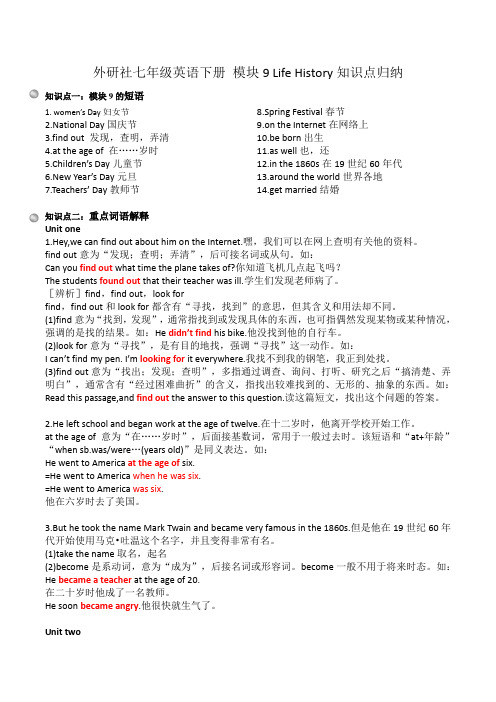
外研社七年级英语下册模块9 Life History知识点归纳知识点一:模块9的短语1. women’s Day妇女节2.National Day国庆节3.find out 发现,查明,弄清4.at the age of 在……岁时5.Children’s Day儿童节6.New Year’s Day元旦7.Teachers’ Day教师节8.Spring Festival春节9.on the Internet在网络上10.be born出生11.as well也,还12.in the 1860s在19世纪60年代13.around the world世界各地14.get married结婚知识点二:重点词语解释Unit one1.Hey,we can find out about him on the Internet.嘿,我们可以在网上查明有关他的资料。
find out意为“发现;查明;弄清”,后可接名词或从句。
如:Can you find out what time the plane takes of?你知道飞机几点起飞吗?The students found out that their teacher was ill.学生们发现老师病了。
[辨析]find,find out,look forfind,find out和look for都含有“寻找,找到”的意思,但其含义和用法却不同。
(1)find意为“找到,发现”,通常指找到或发现具体的东西,也可指偶然发现某物或某种情况,强调的是找的结果。
如:He didn’t find his bike.他没找到他的自行车。
(2)look for意为“寻找”,是有目的地找,强调“寻找”这一动作。
如:I can’t find my pen. I’m looking for it everywhere.我找不到我的钢笔,我正到处找。
(3)find out意为“找出;发现;查明”,多指通过调查、询问、打听、研究之后“搞清楚、弄明白”,通常含有“经过困难曲折”的含义,指找出较难找到的、无形的、抽象的东西。
外研版丨七年级下册英语Module9~Module11知识点总结

2. 11 岁时,父亲去世。次年,他只开始了自己的写作生涯;
3. 他交友甚广,非常幽默。他一生写了大量作品,于 世。
1910 年 4 月 21 日去
Step 2 词汇联想
1. 工厂 factory
2. 幽默的 humorous
3. 辍学 drop out of school
第二部分 再按照时间顺序具体介绍马克· 吐温经历的事情。He dropped out of school and worked in a factory the next year. Then he did different jobs and began writing.
第三部分 最后再对马克·吐温简单总结一 下。 He wrote lots of works in his life. He died on April 21, 1910
Step 5 范文展示 Mark Twain Mark Twain was born in America in 1835 and he was one of the greatest writers in the world. His father died at the age of 11. He dropped out of school and worked in a factory the next year. Then he did different jobs and began writing. Mark Twain liked making friends with others and he was very humorous. He wrote lots of works all his life. He died on April 21, 1910. Module 10 ★重点单词 1. world-famous 举世闻名的 2. on holiday 度假 3. movie star 电影明星 4. the Pacific Ocean 太平洋 5. by plane 乘飞机 6. at the airport 在机场 7. such as 比如
外研版英语2022-2023学年七年级下册Module9重点知识

38 154 short poems
a few long poems
6、Like many people four hundred years ago, Shakespeare’s parents didn’t learn to read or write.
( B ) It’s important ____ a foreign language.
针对性训练
一、单项选择
( C)1. I’m sure I can _____ the truth one day.
A. look out
B. take out
C. find out
D. go out
( A)2. He went to America _____________ May 26th, 2017.
A. look for
B. find
D. find out
v. 原型 leave v. 原型begin "当…时候" 3、He left school and began work at the age of twelve.
at the age of “在……岁时”, 后面 直接+ 数字
at the age of ... = when sb. was/ were ... year(s) old
他变得很出名。(过去) He became famous. 他成为了一名著名的作家。 He became a famous writer.
4、But he took the name Mark Twain and became very famous in the 1860s.
in the 1860s
外研版初中英语七下Module 9 自学(译文知识点)

M o d u l e 9 单词March [mɑːtʃ] n. 3 月April ['eiprəl] n. 4 月June [dʒu:n] n. 6 月Women's Day妇女节National Day国庆节Children's Day儿童节July [dʒʊˈlaɪ]n. 7月August [ɔː'gʌst]n. 8月September [sep'tembə] n. 9 月October [ɒk'təʊbə] n. 10 月November[nə(ʊ)'vembə] n. 11 月December [dɪ'sembə] n. 12 月writer ['raɪtə]n.作家find out 发现 ; 查明 ; 弄清real *[riːl] adj.真实的; 真正的at the age of 在……岁时newspaper*['njuːzpeɪpə; 'njuːs-] n.报纸exact[ɪg'zækt; eg-] adj. 准确的; 确切的date [ɪg'zækt; eg-] n.日期become [bɪ'kʌm] v. ( became ) 成为inthe 1860s 在19世纪60年代play [pleɪ] n. 剧本; 戏剧poem ['pəʊɪm] n.诗歌marry ['mærɪ]v. 结婚successful [sək'sesfʊl; -f(ə)l] adj. 成功的work [wɜːk] n. 作品; 著作build [bɪld]v. ( built ) 建造on prep. 在……河边fire ['faɪə] n.火; 火灾die [daɪ]v. 死; 去世rich [rɪtʃ] adj. 富有的language ['læŋgwɪdʒ] n. 语言around the world 世界各地young [jʌŋ] adj. 年轻的【对话翻译】贝蒂:你在读什么?托尼:《汤姆索耶历险记》,它是由著名的美国作家马克吐温写的。
外研版七年级下册Module 9重点内容复习总结

外研版七年级下册module 9重点内容总结【语法】不规则动词的一般过去时用法。
不规则动词过去式构成方式独特,因此需要特殊记忆。
如:①We left at nine o’clock in the morning.我们是早上9点钟离开的。
②They swam in the swimming pool and had a good time.他们在游泳池里游泳,玩得很开心。
③He wrote some postcards and sent some emails.他写了一些明信片,还发了一些电子邮件。
以下列举一些常用的不规则动词及其过去式。
be--was\were leave--leftbuy--bought meet--metcome--came read--readdo--did see--sawget--got spend--spentgo--went swim--swamhave--had write--wrotetake--took send--sentbring--brought put--put除了过去式的变化规则不同以外,不规则动词在肯定句、否定句、疑问句等各种句型中的使用与规则动词相同。
下面我们以spend,come,go,take,see,swim为例具体说明:【重点词汇】marry v. 结婚◆ He married in 1582 and had three children.他在1582年结婚并且有三个孩子。
◆ She married John last year. 她去年嫁给约翰了。
◆ She got married to a young man named Frank.她嫁给了一个叫弗兰克的年轻人。
【探究总结】marry的用法(1)用作及物动词构成短语:marry sb. 意为“和某人结婚”marry sb. to. . . 意为“把某人嫁给…”。
(2)用作不及物动词,一般用副词或介词短语来修饰。
初中英语外研版七下Module9笔记讲解,巩固练习以及知识梳理

初中英语外研版七下Module9笔记讲解,巩固练习以及知识梳理外研版七下M9笔记讲解,巩固练习以及知识梳理Unit1笔记整理 By Zora1.辨析:find out,find与 look for①find out发现;查明;弄清,强调过程,多指通过观察、探索、调查等努力发现或弄清一些具体或抽象的东西②find 找到,发现,强调结果,通常指找到或发现具体的东西③look for 寻找,强调寻找的过程We must find out the truth.我们必须查明真相。
She found a good job at last.最后,她找到了一份很好的工作。
I'm looking for my key.我正在找我的钥匙。
2.at the age of 意为“在······岁时”,后接基数词,可位于句首或句末,常用于一般过去时,相当于when 引异的时间状语从句。
The old man died at the age of ninety.这位老人是在90岁时去世的。
【拓展】in+形容词性物主代词+整十的基数词的复数,表示“在某人几十多岁的时候”He lost work in his forties. 他在他四十多岁的时候丢掉了工作。
3.newspaper 可数名词,read newspapers意为“看报纸”。
4.exact adj.准确的,确切的I don't remember the exact words,我不记得确切的话了。
[拓展] exactly 副词,意为“准确地,确切地”5.date n.日期询问日期用 what.-What's the date today? -It's March 15th,6.take the name 意为“取名;起名”。
When did you take the pen name Shan He?你什么时候取了山河这个笔名?7.become 作连系动词,意为“变得”,后接形容词作表语。
外研版七年级下册英语Module 9 模块知识点归纳

Module 9 Life history必背单词1. writer n. 作家→write v. 写2. real adj. 真实的;真正的→really adv. 真正地3. ee(过去式)5. March n. 3月6. April n. 4月7. June n. 6月8. July n. 7月9. August n. 8月10. September n. 9月11. October n. 10月12. November n. 11月13. December n. 12月14. newspaper n. 报纸15. date n. 日期必背短语16. Women's Day 妇女节17. National Day 国庆节18. Children's Day 儿童节19. find out 发现;查明,弄清20. at the age of 在……岁时21. in the 1860s 在19世纪60年代必背句子22. I'm writing about him for my English class.我正在为我的英语课写关于他的东西。
23. Look at this!看这个!24. What did he do?他做什么工作?25. Enjoy the book.愿你喜欢这本书。
必背单词1. marry v. 结婚→married(过去式)2. successful adj. 成功的→succeed v. 成功→success n. 成功→successfully ad v. 成功地3. work n. 作品;著作→works pl.4. build v. 建造→built(过去式)→building n. 建筑物5. die v. 死;去世→dead adj. 死的→death n. 死亡6. rich adj. 富有的→poor(反义词)贫穷的7. play n. 剧本;戏剧8. poem n. 诗歌9. on prep. 在……河边10. fire n. 火,火灾11. language n. 语言必背短语12. in one's life 在某人的一生中13. many other languages 许多其他的语言14. see plays 看戏剧15. finish school 毕业必背句子16. Like many people 400 years ago, Shakespeare's parents didn'tlearn to read or write.像400年前的许多人一样,莎士比亚的父母没有学习过读书和写作。
外研版七年级下册Module 9重点内容总结
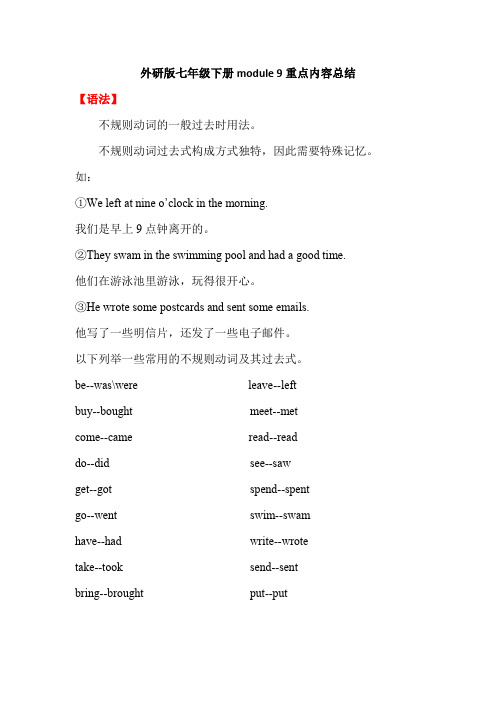
外研版七年级下册module 9重点内容总结【语法】不规则动词的一般过去时用法。
不规则动词过去式构成方式独特,因此需要特殊记忆。
如:①We left at nine o’clock in the morning.我们是早上9点钟离开的。
②They swam in the swimming pool and had a good time.他们在游泳池里游泳,玩得很开心。
③He wrote some postcards and sent some emails.他写了一些明信片,还发了一些电子邮件。
以下列举一些常用的不规则动词及其过去式。
be--was\were leave--leftbuy--bought meet--metcome--came read--readdo--did see--sawget--got spend--spentgo--went swim--swamhave--had write--wrotetake--took send--sentbring--brought put--put除了过去式的变化规则不同以外,不规则动词在肯定句、否定句、疑问句等各种句型中的使用与规则动词相同。
下面我们以spend,come,go,take,see,swim为例具体说明:肯定否定一般疑问句回答I spent two days here. I didn’t (didn’t)spendtwo days here.Did you spend twodays here?Yes,I did.No,I didn’t.You came here yesterday. You didn’t (didn’t)come here yesterday.Did you come hereyesterday?Yes,you did.No,you didn’t.He\She went to work by bus. He\She didn’t (didn’t)go to work by bus.Did he\she go towork by bus?Yes,he\she did.No,he\shedidn’t.It took two hours to go there. It didn’t (didn’t)taketwo hours to go there.Did it take twohours to go there?Yes,it did.No,it didn’t.We saw the famous film star. We didn’t (didn’t) seethe famous film star.Did we see thefamous film star?Yes,we did .No,we didn’t.They swam in the sea. They didn’t (didn’t)swim in the sea.Did they swim inthe sea?Yes,they did.No,they didn’t.【重点词汇】marry v. 结婚◆ He married in 1582 and had three children. 他在1582年结婚并且有三个孩子。
外研版(2012新版)七年级下册module9~module10知识点

他去了欧洲,然后又去了澳大利亚。
我出生于1995年,从小九决定要成为一名科学家。
他们在1880年重建了这栋建筑物,从那时起,就很多游客去参观。
我正在英语课上写一篇关于美国历史的文章。
Module101. Where are you going on holiday?To los Angles。
2. How long did it take to get there?It took me about nine hours.3. We were tired so we relaxed at home and began our tour of the city yester day.4. There were lots of tourists,so first of all,we had to wait in line for anhour,and then we went to the top.趁热打铁我两年前去过巴黎而且玩得很开心。
坐飞机去迪士尼要多长时间?你在哪里停留了多长时间?明天我们将会去参观著名的长城。
卢浮宫(Louvre Museum)有许多注明的艺术作品,例如Mona Lisa.主要语法Module 7—module10 一般过去时一、一般过去时表示的意义:1、表示过去某个时间发生的动作或存在的状态,常和表示过去的时间状语连用,如yesterday, last night, in 1990, two days ago等。
如:I got up at 6:30 yesterday. 我昨天6:30起床。
【动作】She was at home last night.. 她昨天晚上在家。
【状态】2、表示过去经常或反复发生的动作,常和often, always等表示频度的时间状语连用。
如:He always went to work by bus last year. 去年他一直乘公共汽车上班。
佳木斯市第六中学七年级英语下册 Module 9 Life history知识梳理外研版
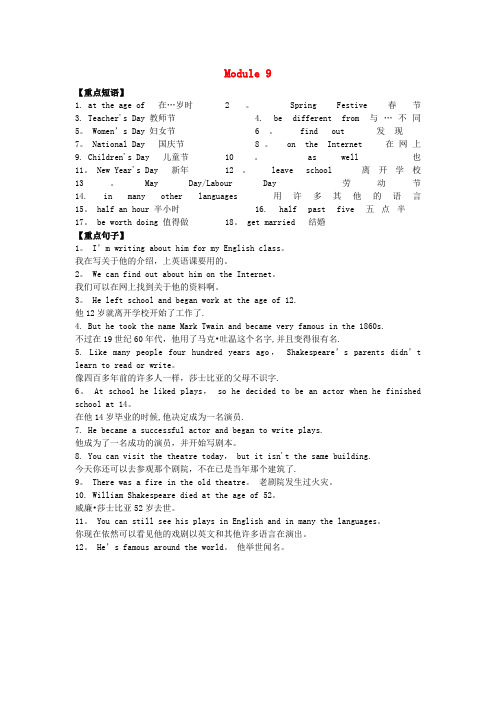
Module 9【重点短语】1. at the age of 在…岁时2。
Spring Festive 春节3. Teacher's Day 教师节 4. be different from 与…不同5。
Women’s Day 妇女节6。
find out 发现7。
National Day 国庆节8。
on the Internet 在网上9. Children's Day 儿童节10。
as well 也11。
New Year's Day 新年12。
leave school 离开学校13。
May Day/Labour Day 劳动节14. in many other languages 用许多其他的语言15。
half an hour 半小时16. half past five 五点半17。
be worth doing 值得做18。
get married 结婚【重点句子】1。
I’m writing about him for my English class。
我在写关于他的介绍,上英语课要用的。
2。
We can find out about him on the Internet。
我们可以在网上找到关于他的资料啊。
3。
He left school and began work at the age of 12.他12岁就离开学校开始了工作了.4. But he took the name Mark Twain and became very famous in the 1860s.不过在19世纪60年代,他用了马克•吐温这个名字,并且变得很有名.5. Like many people four hundred years ago,Shakespeare’s parents didn’t learn to read or write。
像四百多年前的许多人一样,莎士比亚的父母不识字.6。
新外研版七年级下册英语Module9知识点+练习
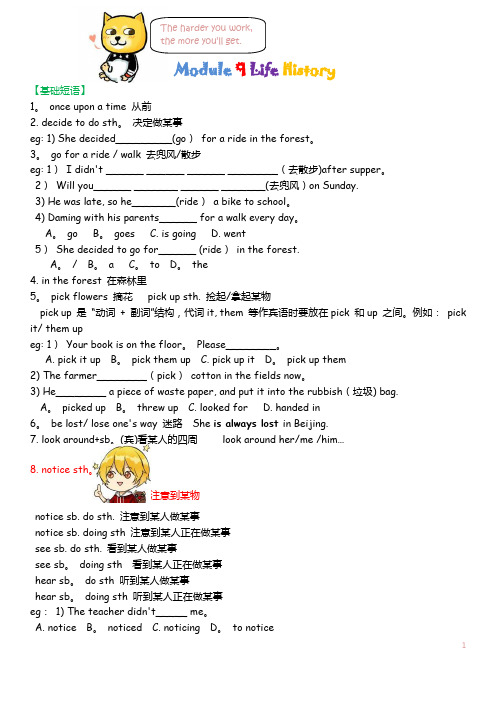
The harder you work,the more you’ll get.Module9Life History【基础短语】1。
once upon a time 从前2. decide to do sth。
决定做某事eg: 1) She decided_________(go)for a ride in the forest。
3。
go for a ride / walk 去兜风/散步eg: 1)I didn't ______ ______ ______ ________(去散步)after supper。
2)Will you______ _______ ______ _______(去兜风)on Sunday.3) He was late, so he_______(ride)a bike to school。
4) Daming with his parents______ for a walk every day。
A。
go B。
goes C. is going D. went5)She decided to go for______ (ride)in the forest.A。
/ B。
a C。
to D。
the4. in the forest 在森林里5。
pick flowers 摘花pick up sth. 捡起/拿起某物pick up 是“动词+ 副词”结构,代词it, them 等作宾语时要放在pick 和up 之间。
例如:pick it/ them upeg: 1)Your book is on the floor。
Please________。
A. pick it up B。
pick them up C. pick up it D。
pick up them2) The farmer________(pick)cotton in the fields now。
3) He________ a piece of waste paper, and put it into the rubbish(垃圾) bag.A。
七年级下册英语外研版M9知识点

七年级下册英语外研版M9知识点英语作为国际通用语言,很多学生都要在学校里学习英语。
看到英语书上的生词和语法,感觉非常头疼,不知道该从哪里下手学习。
其实,只要熟悉一些基础知识,学习英语也就变得更加容易。
接下来,让我们来了解一下七年级下册英语外研版M9知识点。
一. 时态时态是英语中的重要知识点。
通常情况下,我们会使用一些简单的时态,例如:1. 现在时:表示当前正在发生的事情。
例如:I go to school every day.2. 过去时:表示过去发生的事件。
例如:Yesterday, I went to the park.3. 将来时:表示将要发生的事情。
例如:Tomorrow, I will visit my grandparents.二. 单词拼写单词拼写也是英语中的基础知识点。
每个单词都有其特定的拼写方法。
如果想熟练运用英语,就需要通过大量的练习来掌握拼写技巧。
例如:1. Apple:使用两个P,一个L,E结尾。
2. Tuesday:使用两个S,U和E结尾。
3. Listen:以L为开头,使用两个T和E结尾。
三. 数字表达数字在英语中是另一个基础知识点。
数字可以用来表达日期、时间、数量等。
以下是一些例子:1. 日期:Today is April 22, 2021.2. 时间:It is 3:30 in the afternoon.3. 数量:I have three books.四. 词语辨析在英语学习中,词语辨析也是一个重要的知识点。
有时候,两个词的意思很相似,但使用时却有所不同。
以下是一些例子:1. Take和BringTake用于描述从一个地方到另一个地方,带走或拿走某物,而Bring则是用于描述将某物带到一个地方。
例如:- Take the book to the library.(把书带到图书馆去。
)- Bring the drinks to the party.(把饮料带到派对上来。
七年级下英语九模块知识点
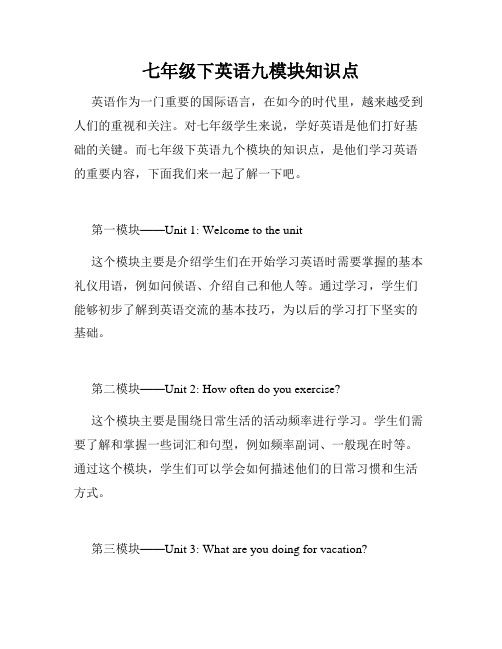
七年级下英语九模块知识点英语作为一门重要的国际语言,在如今的时代里,越来越受到人们的重视和关注。
对七年级学生来说,学好英语是他们打好基础的关键。
而七年级下英语九个模块的知识点,是他们学习英语的重要内容,下面我们来一起了解一下吧。
第一模块——Unit 1: Welcome to the unit这个模块主要是介绍学生们在开始学习英语时需要掌握的基本礼仪用语,例如问候语、介绍自己和他人等。
通过学习,学生们能够初步了解到英语交流的基本技巧,为以后的学习打下坚实的基础。
第二模块——Unit 2: How often do you exercise?这个模块主要是围绕日常生活的活动频率进行学习。
学生们需要了解和掌握一些词汇和句型,例如频率副词、一般现在时等。
通过这个模块,学生们可以学会如何描述他们的日常习惯和生活方式。
第三模块——Unit 3: What are you doing for vacation?这个模块主要是让学生们学习如何询问关于假期计划的问题以及如何用现在进行时来描述正在进行的活动。
学生们通过学习这个模块能够提高他们的口语表达能力,同时也能够了解到一些不同国家和地区的风俗习惯。
第四模块——Unit 4: I want to be an actor这个模块主要是让学生们学习如何表达自己的职业梦想和理想。
学生们需要学习并掌握一些关于职业名称和职业描述的常见词汇和句型。
通过这个模块的学习,学生们能够更好地了解不同职业的特点,为以后选择自己的职业道路提供一定的参考。
第五模块——Unit 5: Do you want to watch a game show?这个模块主要是让学生们学习关于电视节目的词汇和表达方式。
学生们将会学到一些关于电视节目类型、喜好以及表达同意和不同意的句型。
通过学习这个模块,学生们可以更好地了解到不同类型的电视节目,并能够流利地表达自己对某个电视节目的观点。
第六模块——Unit 6: It's raining!这个模块主要是让学生们学习关于天气的词汇和表达方式。
外研社七年级下册英语第九模块知识点总结及练习

二、知识点的梳理at the age of 在…岁时at the age of + 基数词=基数词+years of age=基数词+years old2、around the world 世界各地3、finish school 完成学业4、be difficult from 与…不同5、月份:一月:January二月:February三月:March四月:April五月:May月:June七月:July八月:August 九月:September 十月:October 十一月:November 十二月:December6、find out 找出,查明。
强调过程,指通过观察,探索、调查等努力发现或搞清楚一些具体或抽象的东西。
find 发现。
强调结果,通常接较为具体的东西作宾语。
7、on the Internet 在网上8、Children’s Day 儿童节National Day 国庆节Women’s Day 妇女节New Year’s Day 新年Teacher’s Day 教师Labour Day 劳动节Spring Festival 春节9、as well as也,同样10、become famous for… 以…而变得出名be famous for 因…而著名be famous as 作为…而出名11、leave school 退学,离校12、at school 在学校13、in many other language 用许多其他的语言14、half an hour 半小时15、half past five 五点半16、be worth doing 值得做17、get / be married to sb. 结婚marry sb. 与某人结婚18、write about 写…,写有关…19、take the name 取名20、die:死,去死,其过去式为died,现在分词为dying,形容词为dead.1)die , dead , dying区分die 动词,强调“死”这一瞬间的动作,非延续性动词。
外研版七年级英语下册Module9词汇、知识点总结
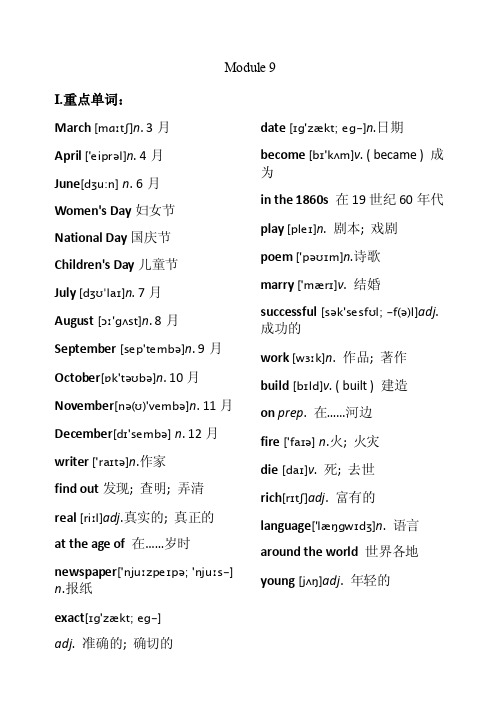
Module 9 I.重点单词:March [mɑːtʃ]n. 3月April ['eiprəl]n. 4月June[dʒu:n] n. 6月Women's Day妇女节National Day国庆节Children's Day儿童节July [dʒʊˈlaɪ]n. 7月August [ɔː'gʌst]n. 8月September [sep'tembə]n. 9月October[ɒk'təʊbə]n. 10月November[nə(ʊ)'vembə]n. 11月December[dɪ'sembə] n. 12月writer ['raɪtə]n.作家find out发现; 查明; 弄清real [riːl]adj.真实的; 真正的at the age of 在……岁时newspaper['njuːzpeɪpə; 'njuːs-] n.报纸exact[ɪg'zækt; eg-]adj. 准确的; 确切的date [ɪg'zækt; eg-]n.日期become [bɪ'kʌm]v. ( became ) 成为in the 1860s 在19世纪60年代play [pleɪ]n. 剧本; 戏剧poem ['pəʊɪm]n.诗歌marry ['mærɪ]v. 结婚successful [sək'sesfʊl; -f(ə)l]adj. 成功的work [wɜːk]n. 作品; 著作build [bɪld]v. ( built ) 建造on prep. 在……河边fire ['faɪə] n.火; 火灾die [daɪ]v. 死; 去世rich[rɪtʃ]adj. 富有的language['læŋgwɪdʒ]n. 语言around the world 世界各地young [jʌŋ]adj. 年轻的II.重点短语:1.月份:January February March April May June July August September October November December2.in January 在一月, 当有last ,next ,every ,this等词,时间前的on ,in 应去掉;具体到日期用介词on: on M arch 8th.3.at the age of=at +年龄=when sb. be …years old 在… 岁时4.marry sb .与某人结婚marry sb. to sb. 把某人嫁给某人be married to sb. 与某人结婚marry 是短暂性动词,不与时间段搭配,要用be married5.learn to do sth 学习做某事6.be worth doing sth .值得做某事7.be different from与…不同;the same as .与..相同8.successful 形容词, 动词:succeed , 名词successsucceed in doing sth. 成功做某事=be successful in doing sth.9.around the world=all over the world 世界各地10.as well as 和;同;既…又.. 与主语放在一起用就远原则11.on a boat 乘船=by boat12.节日:Teachers’s Day 教师节Children’s Day 儿童节Women’s Day 妇女节New Y ear’s Day 元旦Father’s Day 父亲节Mother’s Day 母亲节National Day国庆节Christmas Day 圣诞节民族节日前加the:the Spring Festival 春节the Mid-Autumn Day 中秋节the Dragon Boat Festival端午节13.begin ..with.以…开始begin to do sth .开始做某事begin doing sth .开始做某事14.work 作品,名词,可数; 工作,不可数15.die,死亡, 动词. 名词:death ,形容词dead,死的,无生命的,dying ,快要死的.16..find out意为“发现、查明、弄清”,多指通过调查、寻问、打听、研究之后搞清楚,弄明白。
外研版英语七年级下册Module9Lifehistory总结

Module 9 Life historyUnit 1常用词组1.Teachers’Day 教师节2.Women’s Day 妇女节3.National Day 国庆节4.Children’s Day 儿童节5.May Day 五一劳动节6.be different from... 与……不同7.in April 1935 在1935年4月8.by sb. 由某人创作9.write about sb. 写关于某人的事10.find it/them out 把它/它们搞清楚、弄明白11.real name 真名12.leave school 离开学校(不上学)13.begin work 开始工作14.at the age of... 在……岁时15.write for... 为……而写16.other cities 其他城市17.begin stories 开始写故事18.take the name Mark Twain 取名马克·吐温19.become famous 变得出名20.in the 1860s 在19世纪60年代21.as well 也22.a newspaper writer 一名报社作者重点句型1.Betty’s grandfather’s life was different from Betty’s.贝蒂爷爷的生活与贝蒂的不同。
2.He was born in April 1935.他出生在1935年4月。
3.We can find out about him on the Internet.我们可以在互联网上查到关于他的信息。
4.He left school and began work at the age of twelve.他12岁时离开学校并开始工作。
5.Look at this!看这个!6.Enjoy the book. 享受这本书。
要点精析1. Women’s Day 妇女节women’s是所有格形式,不以-s结尾的复数名词的所有格加“’s”。
七年级下英语九模块知识点
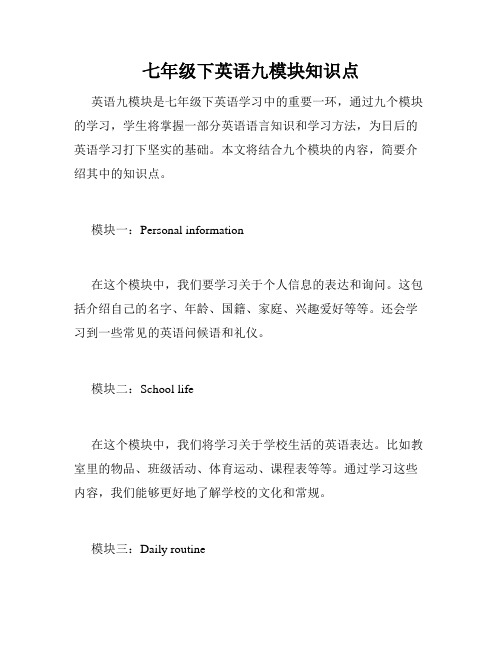
七年级下英语九模块知识点英语九模块是七年级下英语学习中的重要一环,通过九个模块的学习,学生将掌握一部分英语语言知识和学习方法,为日后的英语学习打下坚实的基础。
本文将结合九个模块的内容,简要介绍其中的知识点。
模块一:Personal information在这个模块中,我们要学习关于个人信息的表达和询问。
这包括介绍自己的名字、年龄、国籍、家庭、兴趣爱好等等。
还会学习到一些常见的英语问候语和礼仪。
模块二:School life在这个模块中,我们将学习关于学校生活的英语表达。
比如教室里的物品、班级活动、体育运动、课程表等等。
通过学习这些内容,我们能够更好地了解学校的文化和常规。
模块三:Daily routine这个模块中,我们会学习到如何表达日常生活的一些行为,比如起床、吃饭、上学、做作业等等。
同时,还会学习到一些日常用品的英文表述,比如牙刷、毛巾等。
模块四:Hobbies在这个模块中,我们要学习有关兴趣爱好的表达和问询。
这包括运动、看电影、听音乐等等。
通过学习这些内容,我们能够更好地交流与别人的共同爱好。
模块五:Food and drink在这个模块中,我们将学习有关食物和饮料的英语表达。
包括各种烹饪方式、食材、特色美食等等。
相信在日常生活中,这些内容一定能为我们带来帮助。
模块六:Shopping这个模块中,我们将学习购物时的英语表达。
包括问询商品、价格、大小、颜色以及与售货员的交流。
这些内容对于我们的日常购物非常有帮助。
模块七:Travel在这个模块中,我们会学习关于旅行的英语表达。
比如预定酒店、买机票、打的士等等。
通过学习这些内容,我们能够更好地了解旅游行业和出行方式。
模块八:Health这个模块中,我们要学习如何表达身体健康和身体不适。
我们将学会一些常见病症的英语表达,比如头痛、发烧、感冒等等。
同时还会学习到一些保持身体健康的诀窍。
模块九:Holidays在这个模块中,我们会学习关于节假日的英语表达。
- 1、下载文档前请自行甄别文档内容的完整性,平台不提供额外的编辑、内容补充、找答案等附加服务。
- 2、"仅部分预览"的文档,不可在线预览部分如存在完整性等问题,可反馈申请退款(可完整预览的文档不适用该条件!)。
- 3、如文档侵犯您的权益,请联系客服反馈,我们会尽快为您处理(人工客服工作时间:9:00-18:30)。
一.一般过去时动词变化规则动词变化规则规则变化:1.直接加ed 如:work—worked2.以e结尾的单词,直接加d 如:live—lived3.以辅音字母+y结尾的,变y为i加ed 如:study—studied4.以元音字母+y结尾的,直接加ed 如:enjoy—enjoyed5.以重读闭音节结尾的,双写最后的辅音字母+ed 如:stop—stopped不规则变化:have/has -- had eat--ate see—sawam/is—was are--were go—wentdo--did take--took run--ranlend--lent sleep--slept get—gotmeet—met bring—brought buy—boughtthink—thought say—said give—gaveput—put write--wrote swim--swamdig--dug set--set tell--told补充内容:(句子中谓语动词是用一般过去时还是用现在完成时,取决于动作是否对现在有影响。
)1. 带有确定的过去时间状语时,要用过去时。
如:yesterday(昨天)、two days ago…(两天前…… )、last year…(去年…)、the other day(前几天)、once upon a time(很久以前)、just now(刚才)、in the old days(过去的日子里)、before liberation(解放前…)、When I was 8 years old(当我八岁时…)、at+一个时间点(注意:在谈到已死去的人的情况时,多用过去时。
)2. 表示过去连续发生的动作时,要用过去时。
这种情况下,往往没有表示过去的时间状语,而通过上下文来表示。
3. 表示过去一段时间内经常或反复的动作。
常与always,never等连用。
4. 如果强调已经终止的习惯时要用used to do(过去常常做,而现在不那样做了)5. 有些句子,虽然没有表示过去确定时间的状语,但实际上是指过去发生的动作或存在的状态的话,也要用过去时。
课本重难点知识讲解:1.golden, gold区别golden 形容词金色的, 金黄色的,gold名词黄金, 金币或形容词金的, 金制的2.finish用法finish sth/doing sth3.sleepy, asleep, sleeping 用法区别sleepy是形容词,意思是:困倦的,想睡的。
asleep是形容词,是表语形容词,只能做表语,意思是:睡着的。
be asleep 表示睡着的状态。
sleeping是形容词,意思是:睡着的,不一定用做表语,可以用做定语,另外它还是个动名词。
fall /drop asleep是动词词组,表示入睡(动作)。
例如:He has fallen asleep。
1.die of, die from,dying, deaddie of 表示“死于……病”或冻死,气死,或死于过度悲伤。
(内部原因)die of cancer/grief/hunger/anger/colddie from表示死于外伤,事故,劳累过度。
(外部原因)die from polluted air/overworkdie常用短语die for one’s country为国捐躯die down熄灭、平息die off绝种、枯死die away消逝、静下来die a heroic death英勇牺牲5. open, close 用法详解6. lie [用法]对“lie”和“lay”这两个词的用法和形式混淆不清。
下面把它们的拼写形式及意义进行比较:现在式过去式过去分词现在分词lie lay lain lying 躺/ 位于… / 在于…lay laid laid laying 放/ 下蛋lie lied lied lying 说谎*lie (n.)谎言(tell a lie说谎)巧记lie和lay躺lie,lay,lain,lie in bed again;撒谎lie,lied,lied,don't be a liar;产蛋lay,laid,laid,a hen laid an egg;放置A loy picked it up,and laid it in the bag质量检测题一、词汇写出下列动词的过去式。
一.词汇。
A.给处下列动词的过去式形式。
hurry--- go---- buy---- begin--- destroy---know--- write--- come--ride--- study--- bring---- take----read--- eat---- fly---- sleep--- die---- stay----tell---- have---- say1.lose ________ 2.notice ________ 3.count ________ 4.do ________ 5.be ________ 6.walk ________7.pick ________ 8.live ________ 9.decide ________10.finish ________ 11.enter ________ 12.hurry ________ 13.knock ________ 14.push ________ 15.look ________ 16.play ________ 17.stop ________ 18.try ________ C)用所给词的适当形式填空。
1.They ________ (study)together yesterday.2.We decide ________ (go)skating next week.3.There are twelve ________ (month)in a year.4.They ________ (plan)their holiday just now.5.I ________ (stay)at home ten minutes ago.6.He ________ (open)his eyes and smiled.7.They are ________ (go)to Japan next Monday.8.The little girl wanted ________ (have)two more apples.9.She ________ (like)playing basketball but she doesn't ________ (like)playing football.10.Did you enjoy ________ (lie)on the beach?二、选择填空1.________ you ________ to the park last week?A.Were, go B.Did, go C.Were, went D.Did, went 2.— Did you have a good time?—________.A.Yes, I am. B.Yes, I was. C.Yes, I did. D.Yes, we are. 3.Mike ________ his homework yesterday.A.didn't do B.wasn't do C.didn't D.didn't did 4.The mother was very worried because her daughter ________.A.lose B.lost C.is lost D.was lost 5.Betty saw a wallet on her way to school. She ________ and then waited for its owner.A.picked B.picked up it C.picked them D.picked it up 6.He ________ his hometown after graduated from Qinghua University.A.came back B.went back C.returned D.returned to 7.Mary entered ________ the house quietly.A.to B.at C./ D.in8.— Do you know the boy ________ Tony?— Sorry, I don't.A.call B.calling C.calls D.called9.Don't point ________ others. It's not polite.A.at B.in C.on D.for10.My mother always ________ me fairy tales when I was a child.A.spoke B.said C.talked D.told 11.Lingling knocked ________ the door, ________ nobody answered.A.on, and B.on, but C.at, and D.to, but 12.There ________ no one there so she entered the room.A.is B.are C.was D.were13.He finished ________ the book and returned it to the library.A.read B.to read C.reading D.reads 14.John played ________ soccer and Kate played ________ piano.A.the, the B.the, / C./,/ D./,the 15.How ________ your journey?A.did B.was C.were D.are16. ( ) 11. I like this dress. Can I ______________?A. try on itB. try on themC. try it onD. try them on17. ( ) 15. When did you finish ___________the film last Sunday ?A. to seeB. sawC. seeD. seeing18.( ) 16. My teacher talked to me _______ my father.A. asB. likeC. as ifD. as like三、完成句子A)改正每行中的一个错误。
